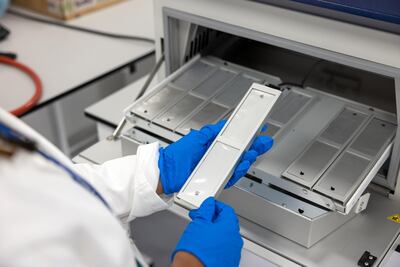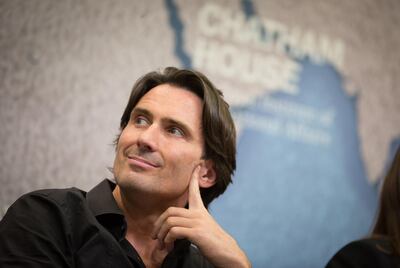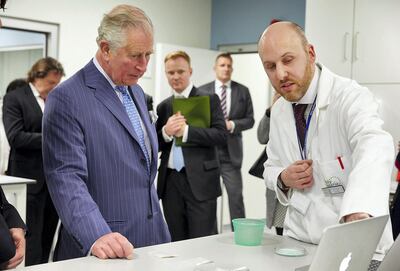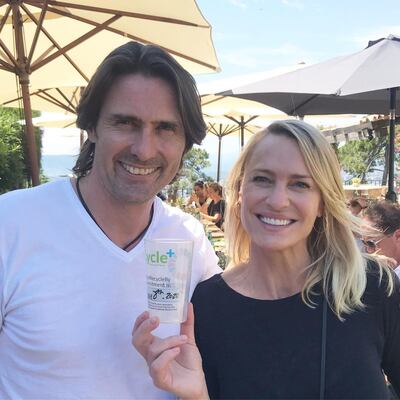British start-up Polymateria, the creator of the world's first biodegradable and recyclable plastic, will supply its revolutionary products to the electric racing series Extreme E, which kicks off in Saudi Arabia next month.
Cups and food packaging made from Polymateria’s thin, flexible polyethylene plastic will be used by the 10 teams competing at motorsport's newest form of green racing, which starts in Al Ula on April 3.
Polymateria’s revolutionary Biotransformation technology means its products can either be recycled after the races or biodegrade naturally if they are discarded accidentally in the desert, helping to tackle the growing issue of global plastic pollution.
Niall Dunne, chief executive of Polymateria, said he was looking forward to working with Extreme E on turning the tide on the plastic pollution endemic.
“Unfortunately, 32 per cent of the plastic produced in the world each year winds up in the natural environment,” Mr Dunne told The National.
“If left unchecked, four billion tonnes of plastic pollution will enter our land and oceans by 2050.”

The company found that the majority of the plastic discarded across the world comprises of polyolefins that are produced mainly from oil and natural gas and can take up to 450 years to decompose.
“So, that’s the polypropylene cups you drink your coffee out of or the polyethylene shopping bags you bring your shopping home in,” Mr Dunne said.
The company focused on redesigning those materials at the point of manufacture, biologically and chemically altering the structure to ensure it disintegrates in nature and does not leave behind microplastics – tiny fragments less than 5 millimetres long that are harmful to the environment and the health of animals.
The technology means Polymateria’s plastic breaks down into a harmless sludge or wax when left out in the open air.
“To make that wax attractive to nature, the company uses a prebiotic to trigger the microbes, the bacteria and the fungi that exist in the natural environment to then digest it,” Mr Dunne said.
“So polyethylene we can get back [to nature] in 226 days, and polypropylene, that's your more rigid cup type containers, we can get that back in 326 days at ISO accredited independent laboratories.”

The company’s scientists can control the time it takes for biodegradation, delaying the process depending on how long the product needs to be used.
In the same way supermarket food has a use-by date, Polymateria’s products have an “expiry” date as to when the biodegradation process begins, which can be predicted down to the exact month.
“What we’ve pioneered in order to ensure responsible disposal, is to communicate to the consumer on the pack a recycle-by date – or dispose-by date if, for whatever reason, those materials can't be recycled,” Mr Dunne said.
“That can be any time from six months to three years. We can predict exactly when it becomes active ... and that's why it's so scalable.”

Polymateria was set up in 2015 by Jonathan Seiff – whose great-grandfather Michael Marks founded the British department store Marks & Spencer – and his business partner Lee-Davy Martin, after the pair spotted a gap in the market.
While other biodegradable or compostable plastics exist, they are not always suitable for conventional recycling because they do not break down in the same way as conventional plastic.
The duo set about creating the technology for Polymateria's product, using the knowledge of Dr Chris Wallis who remains the company’s head of innovations.
"They realised that the challenge facing the industry was to develop innovation that was more credible and science-based than anything else before, and also scalable,” said Mr Dunne.
“The size of the plastic pollution pandemic is staggering but they needed something that could scale and work at the level of the problem that we're actually facing, and come up with something that wasn't just going to be a niche innovation.”
The company completed a £15 million ($20.8m) Series A funding round in January last year, which valued the company at £110m, with Planet First Partners the lead investor.
Investors are attracted to the company’s credibility; its products are independently proven to be recyclable and biodegradable in the natural environment in tests carried out by the ISO-accredited Impact Solutions, a British company specialising in plastics expertise.
The funds raised last year allowed Polymateria to expand its global footprint, as well as the laboratories at its west London base.
It is also ramping up the products it supplies to supermarkets in the UK, such as disposable cups, food storage bags and packaging.

In one of its more recent tie-ups, Polymateria was signed by fashion brand Pour les Femmes, founded by American House of Cards actress Robin Wright. The fashion house will use the plastic for all its clothing deliveries to customers and shops.
The latest deal with Extreme E’s global X Prix events is another step forward for the brand, which is also looking at producing biodegradable face masks for the race series in the future.
Collaborating with Extreme E seems a natural fit for Polymateria. The radical new racing series will see electric SUVs competing in extreme environments already damaged or affected by climate and environmental issues.
The five-race event, which debuts in Saudi Arabia on April 3 featuring 20 drivers, will highlight the effects of climate change and human interference on a range of ecosystems in some of the world’s most remote locations.
While in Al Ula, the tour will shine the spotlight on desertification, before speeding on to Senegal, Greenland, Brazil and Argentina.
To minimise its effect on the natural environment, the races are not open to spectators, with fans instead invited to follow the action through a live TV broadcast, and on social media.
Alejandro Agag, chief executive of Extreme E, said the race series teamed up with Polymateria to help drive global awareness of solutions for plastic pollution while reducing its own environmental footprint at the same time.
Environmentally conscious investor Nico Rosberg, a Formula One world champion and founder of the Rosberg X Racing team which will compete in Extreme E, said Polymateria’s concept “is exactly the sort of cutting-edge innovation the world needs, backed up by robust standards and scientific evidence”.


